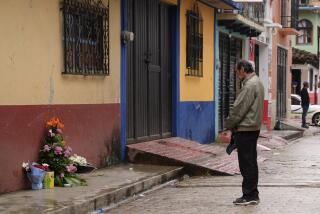Accused Chiapas Governor Resigns
MEXICO CITY — The governor of the southeastern state of Chiapas resigned Wednesday in the face of accusations that he ignored warnings of the Christmas-week massacre of 45 unarmed villagers, allegedly carried out by a gang of attackers linked to Mexico’s ruling political party.
Analysts interpreted the departure of Gov. Julio Cesar Ruiz Ferro as another direct intervention by President Ernesto Zedillo in the troubled state to try to break the stalemate in the 4-year-old conflict with Zapatista rebels.
Zedillo’s Institutional Revolutionary Party, or PRI, has endured worldwide criticism since the Dec. 22 killings of nine men, 21 women and 15 children in the tiny village of Acteal. The PRI has been accused of stalling the national negotiations with the rebels--while supporting armed bands to confront Zapatista supporters in local village conflicts in Chiapas.
Interior Secretary Francisco Labastida, himself appointed Saturday by Zedillo with orders to intensify negotiations on Chiapas, said Ruiz Ferro had requested a leave of absence, “hoping to encourage a climate of understanding and harmony in the state.”
The sacking of political figures in Mexico is usually couched in the face-saving euphemism of a leave of absence. A number of PRI governors have been pushed from office, nearly always as a result of direct presidential pressure.
Roberto Albores Guillen, a national PRI legislator, was nominated as substitute governor to serve out Ruiz Ferro’s term.
Unlike Ruiz Ferro, who was a stranger to Chiapas when he became governor, Albores is leader of the Chiapas delegation in the national Congress.
Ruiz Ferro, a PRI official from Mexico City, was appointed governor in February 1995 when then-Gov. Eduardo Robledo Rincon resigned, just six months after he was elected in a vote that opposition leaders said was riddled with fraud.
Robledo’s 1995 departure also took place in a climate of tension as Zedillo suddenly pulled back his armed forces from a brief foray against Zapatista rebels and called for renewed negotiations.
A set of preliminary agreements was reached in February 1996, but disputes over interpretation of the accords led to a stalemate in September 1996, fueling sporadic local squabbles that remained low-key until the December massacre.
Ruiz Ferro, church officials have said, ignored calls to his office at the start of the killings.
In response to that incident, Zedillo immediately ordered the national attorney general’s office to handle the investigation, taking the case out of state jurisdiction.
Federal prosecutors have moved swiftly, arresting more than 40 suspects. They have charged the PRI mayor of the municipality of Chenalho, which includes Acteal, with organizing and arming the gang of attackers.
Zedillo then sacked Emilio Chuayffet Chemor, Labastida’s predecessor as interior secretary, who had been harshly criticized for failing to advance the Chiapas negotiations.
In a separate appointment, Zedillo on Wednesday named PRI Sen. Rosario Green as foreign secretary, making her the highest-ranking woman in his government. She replaces Jose Angel Gurria Trevino, who was appointed Monday to the critical position of finance secretary.
Having already appointed Labastida as interior secretary and Romarico Arroyo Marroquin as agriculture and rural development secretary, Zedillo has carried out a substantial Cabinet reshuffle that puts close allies in key posts as he starts the second half of his presidency.
The Rev. Gonzalo Ituarte, a Roman Catholic priest in the Chiapas city of San Cristobal de las Casas and a member of a conciliation council, said: “The fact that there has been a change of interior [secretary] and governor is a sign that they recognize the complete failure of their policies. This is the moment of opportunity.”
Lorenzo Meyer, a political scientist at the Colegio de Mexico, said Zedillo had tried unsuccessfully to address the Chiapas situation with a policy of attrition.
“He felt that time was his principal tool for solving the problem--just to hold out until the social base of the Zapatistas faded. He is now learning from his errors,” Meyer said. “It seems he now wants to change tactics, remove the obstacles and resume the negotiations that have been paralyzed since 1996.”
The problem, Meyer added, is that Zedillo has now moved into the second half of his six-year term and “he has lost a lot of time.”
The Zapatistas, meanwhile, had been in an increasingly desperate situation, Meyer noted. They were losing international attention, and their supporters were living in worsening hardship, pushed to the margins by local PRI allies. Then, he said, “the anti-Zapatistas did their best work for them, although the cost was enormous.”
Felipe Calderon, head of the opposition National Action Party, welcomed Ruiz Ferro’s resignation “as an inevitable step in the face of events that are a disgrace for Mexico.”
But opposition members also attacked the appointment of Albores.
Democratic Revolution Party Deputy Alfonso Ramirez Cuellar said: “What is being proposed is practically the same recipe, putting in a governor of the PRI linked to the [local power barons] who also cover up for and encourage the most backward groups in that state.”
Times staff writer Mary Beth Sheridan in San Cristobal de las Casas contributed to this report.
More to Read
Sign up for Essential California
The most important California stories and recommendations in your inbox every morning.
You may occasionally receive promotional content from the Los Angeles Times.










